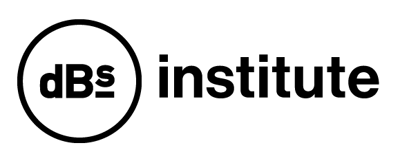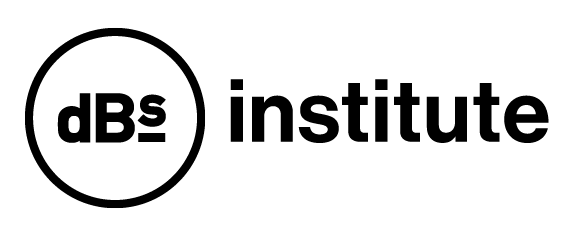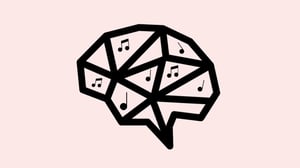dBs students and staff share their stories of overcoming learning differences through music.
At dBs Sound and Music Institute, we welcome a high percentage of students through our doors every year who have learning differences such as dyslexia, ADHD, dyscalculia and dyspraxia.
Many of these students have come through the education system mistakenly labelled as ‘incapable’ or ‘unmotivated’, only to achieve phenomenal success at the end of their studies with us. In this article, we examine the experiences of these students, the empowering role music plays in their education and what dBs does to ensure every student is able to maximise their unique potential.
The relationship between learning differences and creativity
It’s well known that a high proportion of students pursuing creative subjects at further and higher education level have learning differences. This isn’t a product of neurodiverse people being more creative than other people, dBs tutor Phin Head (who is dyslexic himself) tells me. It’s more the case that the experience of having a learning difference can lead people towards creative subjects.
“Often people who have, for whatever reason, fallen out of education will see music technology and DJing as something quite different from their experience at school, enough so that they want to go and pursue that. When they do, they find that the English and the science and the communication and the IT skills – all the other stuff that is useful for real life is a necessary part of that, but these things now have a point to them. Well, that’s enormously powerful. In terms of empowering people, I think music has unparalleled value.”
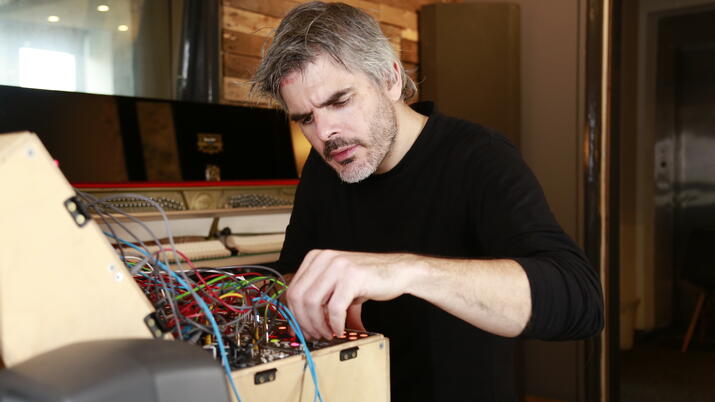
Phin Head is one of many tutors at dBs who understand first-hand what it is like to live with a learning difference
The idea that music technology can open doors to academic study is one that resonates with dBs alumni Rewan, who struggled to focus at school but is now working as a tutor himself. “Before coming to dBs I felt like I had to just get on with stuff. I didn’t know why I couldn’t sit still. I was always drumming at the tables. I was kicked out of two schools and then out-of-school education didn’t work. All I wanted to do was make music all the time. When I found out about dBs and I thought, this is my in! Through dBs, I started to realise that I was quite fascinated by analysing music and the way music affects the human mind.”
Rewan’s personal experiences and the interest he subsequently developed in the psychology of sound, led him to research how music production can help people with ADHD build focus. "People with ADHD have a lower dopamine intake (the reward/happy chemical), which is how our body prompts us to complete tasks. The problem is we don't get enough to satisfy our needs as activities for us have a shorter "shelf life", which leads us to find other sources of enjoyment through different activities. Hence the notoriety for being easily distracted. What I became interested in why people who have ADHD can hold their focus when creating music at the same rate as people without it."
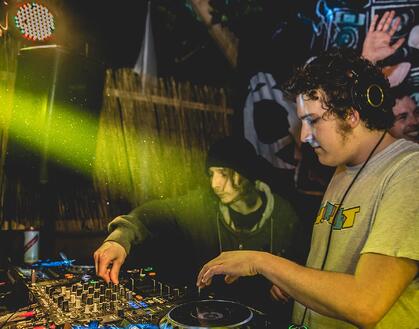 “The thing about creating music - especially ‘in the box’ music like production - is there are so many different things that can hold your interest. You can be tweaking EQs, you can start fiddling around with some melodies, and there are so many different parameters and so many different avenues that you could explore, that you're constantly doing new things. So you're locked in and forget. I think that’s why so many people with ADHD find an outlet in music because it brings solace, it’s that thing that can keep them still."
“The thing about creating music - especially ‘in the box’ music like production - is there are so many different things that can hold your interest. You can be tweaking EQs, you can start fiddling around with some melodies, and there are so many different parameters and so many different avenues that you could explore, that you're constantly doing new things. So you're locked in and forget. I think that’s why so many people with ADHD find an outlet in music because it brings solace, it’s that thing that can keep them still."
On the topic of ADHD and creativity Phin added: "The thing about creativity is that it both requires the mastery of rules, and their suspension. That is to say, one has to know what one is doing (that's the expertise) but simultaneously be able to suspend that and see the world as full of fresh unfiltered possibility. Here's the rub – low latent inhibition (i.e. certain forms of mind-wandering-ness) correlate positively with creativity! So, provided it can be put under control, ADHD can help in the generation of ideas. But you need the expertise to spot which are the good ideas, and the self discipline to then latch on to them and develop them".
Supporting students with learning differences
dBs offers a comprehensive range of support structures to enable students with learning differences are able to reach their full creative and academic potential. Students who believe they may have a particular learning difference are offered assessments, followed by individually tailored academic support. This can range from tutoring for dissertations, setting up special arrangements for assessments, or sessions covering areas of difficulty such as note-taking and strategic planning, depending on a student’s individual needs.
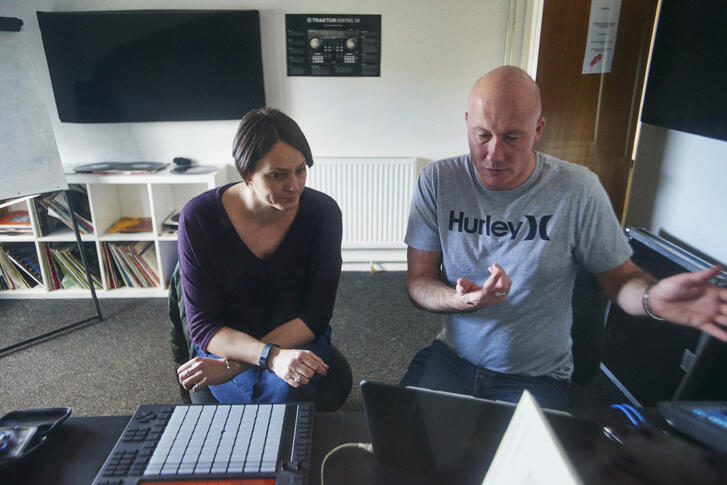
Students with learning differences are supported through individually tailered one-on-one sessions
“We also help students who are diagnosed with learning differences, autism, mental and physical health difficulties to apply for DSAs (Disability Support Allowances), which can be may be used to fund assistive technologies, one-to-one support and other things such as taxis for those who struggle to use public transport depending on their difficulty,” Victoria Morris, Student Support Manager at our Bristol centre tells me. “The funding can also go towards helping students with their mental health and very often neurodiversity goes hand in hand with mental health difficulties.”
Diverse learners united by a common passion
Beyond all the formal support structures in place, dBs’ small class sizes, personal approach and community vibe play an important role in ensuring students with learning differences are able to flourish. “At some universities, you’ll be in a lecture theatre of 200 or something, whereas here, group sizes are generally a max of 20 and even smaller in the studio,” Victoria says. “That's a massive help. Tutors can see if someone's struggling, so they have a much greater awareness of what’s going on and it’s a lot easier to make people feel valued and listened to.”
Olly Ryles, Learning Support Lead at dBs’ Plymouth centre added: “It’s a difficult thing to quantify, but it’s said time and time again that dBs is a really caring environment. I think when you unite on a common interest - creativity and sound and music - you're already speaking the same language to a certain degree. And so everyone is more motivated to succeed.”
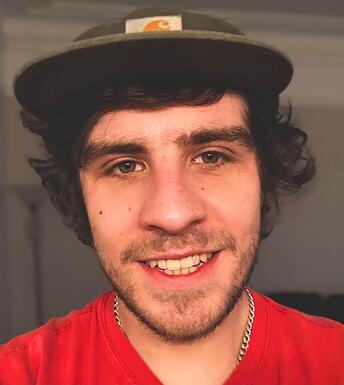
Speaking of the support he’s received whilst studying at dBs, Tom, who has ADHD and High Functioning Autism said: “The challenges I face on a daily basis are not necessarily obvious or seen directly but when I do run into problems caused by my ADHD, help is often no more than an email or video call away. Olly Ryles has been conducting weekly support sessions that have proven invaluable to me and my ability to organise my workflow.”
Electronic music production student Tom De.Wan recieves support for his ADHD and High Functioning Autism.
A non-discriminatory approach
dBs’ commitment to creating an inclusive, accommodating learning environment is such that all students can access academic support sessions, regardless of formal diagnosis. Olly explains: “It can be difficult to draw a fine line under who does and doesn’t have a certain learning difference. Some people identify with the conditions but don’t necessarily have a formal report. Often students who have ‘slipped through the net’ at their previous school will have developed coping mechanisms that mean they don’t present the stereotypical telltale signs.
“Labels like dyslexia and ADHD are really just umbrella terms that cover so many different aspects of learning and they don’t present in the same way across any two individuals. The thing about dBs is, whether you have a diagnosis or not, we will support you. We’ll put similar strategies in place, regardless of whether you have a formal learning disability report.”
On the flip side, students who do have a formal report are never defined by their diagnosis. “We take a very open approach,” Olly says. “We make a point of not judging people by their labels that they come with, but first and foremost as people that have strengths and weaknesses, interests, motivations, difficulties, personal lives, all of which form part of the package as well.”
Speaking about her experiences of studying at dBs with dyslexia, music production student Emily said: “When I came to dBs at 16 years old my tutors recognised my dyslexia not as a weakness, but an area that just needed some support, which they more than gave me in various different ways. I find now at 22 that the struggle with dyslexia doesn’t negatively impact my life and dBs have always worked with me to focus on the things that I enjoy and am good at rather than scrutinising my weaker skill sets.”
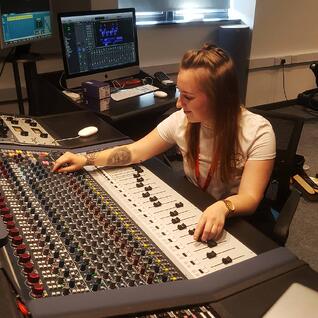 From ‘disability’ to strength
From ‘disability’ to strength
Whilst conditions like dyslexia and ADHD have traditionally been considered a disadvantage, dBs believes they can create unique possibilities for personal growth and achievement.
Victoria explains: “Neurodivergent People will have spent much of their life as a square peg, trying to fit into a round 'neuronormative' hole. As a result, they have to think more creatively about how to fit in and work harder to achieve things that come naturally to most of us. This means they can bring quite different perspectives and unique insights, which can be so valuable. Especially in a creative setting.” (Left: Music production student Emily)
Reflecting on the positive side of her dyslexia, Emily said: “I feel that dyslexia brings a lot of benefits to my music production in terms of alternate strategies. I struggle to read theory books and internet feeds so my methods tend to lie entirely on my own creativity and exploration. I also rely more on how my ears to interact with music rather than implementing strategies. I feel this is an advantage to my production over the strict rules of creation.”
Rewan added: “I think people with ADHD have more awareness of other people and I think they understand human behaviour a bit more because they're constantly reflecting on their own behaviours. Having moved into teaching music production myself I think it helps me in my relationship with my students. Anyone who has gone through their own personal struggles, I think it gives you a lot more compassion.”
Ready to start your journey into music technology education? Check out our range of courses here.
